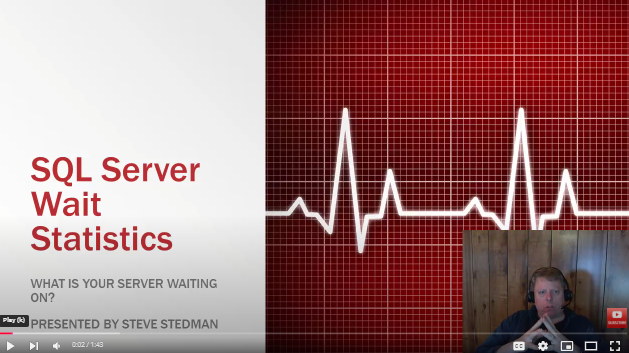Wait statistics, in the context of SQL Server, refer to the amount of time that a query spends waiting to access data in the database. When a client application requests data from the database, the request is placed in a queue and the client application must wait for its turn to access the data. The time that the query spends waiting is called a "wait" and is tracked by SQL Server. This information can be used to identify potential performance bottlenecks and optimize the performance of the database. Wait statistics are commonly used by database administrators to diagnose and troubleshoot performance issues in SQL Server.
In SQL Server, certain wait types indicate that the database engine is waiting on an external process or the operating system. One such wait type is PREEMPTIVE_OS_GETDISKFREESPACE. Understanding this wait type can help you troubleshoot and optimize SQL Server performance, especially in environments with storage-heavy workloads.
What is PREEMPTIVE_OS_GETDISKFREESPACE?
The PREEMPTIVE_OS_GETDISKFREESPACE wait type occurs when SQL Server is asking the operating system to check the available free space on a disk. This wait typically happens during operations like file growth, backup creation, or other tasks requiring verification of storage availability.
In simpler terms, this wait type is SQL Servers way of saying, “I’m waiting for Windows to tell me how much free space is available on the disk.” While short waits are normal, frequent or prolonged PREEMPTIVE_OS_GETDISKFREESPACE waits could indicate an underlying problem with storage or configuration.
Why Does PREEMPTIVE_OS_GETDISKFREESPACE Happen?
There are several reasons why this wait type might occur, including:
- Slow or overloaded storage systems, causing delays in retrieving disk information.
- Frequent file growth operations due to insufficient pre-allocation of database file sizes.
- Large database backups triggering frequent disk space checks.
- High I/O activity on the storage system, leading to contention.
- Disk performance issues, such as degraded drives or networked storage delays.
Identifying the root cause of these waits is essential to improving overall system performance.
How to Monitor PREEMPTIVE_OS_GETDISKFREESPACE Waits
Monitoring PREEMPTIVE_OS_GETDISKFREESPACE waits can help you understand their frequency and impact. The Database Health Monitor is an excellent tool for this. Its Historic Waits Monitoring feature allows you to track when and how often these waits occur, helping you correlate them with database operations and system activity.
With Database Health Monitor, you can identify trends, such as whether these waits are tied to specific backups or file growth events. This data can guide you in optimizing storage and database operations.
What Can You Do About PREEMPTIVE_OS_GETDISKFREESPACE Waits?
If you’re experiencing frequent or prolonged PREEMPTIVE_OS_GETDISKFREESPACE waits, consider these actions:
- Pre-allocate database file sizes to reduce the need for frequent file growth operations.
- Monitor and optimize storage performance, ensuring disks meet SQL Server’s I/O requirements.
- Distribute backups across multiple drives to reduce contention and balance workload.
- Ensure sufficient free space is consistently available on drives used by SQL Server.
- Investigate and address any hardware issues with the storage subsystem, such as degraded drives or network latency for networked storage.
These steps can help minimize PREEMPTIVE_OS_GETDISKFREESPACE waits and improve the responsiveness of your SQL Server environment.
How Stedman Solutions Can Help
At Stedman Solutions, we specialize in SQL Server performance tuning and troubleshooting, including resolving issues with wait types like PREEMPTIVE_OS_GETDISKFREESPACE. Our managed services offer proactive monitoring and expert support to optimize your database and storage setup. Additionally, our Database Health Monitor provides robust tools to track and analyze SQL Server waits, helping you maintain a reliable and efficient environment.
If you’re experiencing performance challenges or want to optimize your SQL Server operations, contact us today. Let us help you achieve a high-performing, reliable SQL Server environment!

Find out more about our SQL Server Managed Services
Applies to
Related Waits
PREEMPTIVE_COM_CREATEACCESSORPREEMPTIVE_COM_GETDATA
PREEMPTIVE_COM_QUERYINTERFACE
PREEMPTIVE_COM_RELEASE
PREEMPTIVE_COM_RELEASEROWS
PREEMPTIVE_COM_SEQSTRMREAD
PREEMPTIVE_COM_SETPARAMETERINFO
PREEMPTIVE_COM_SETPARAMETERPROPE
PREEMPTIVE_DTC_BEGINTRANSACTION
PREEMPTIVE_FILESIZEGET
PREEMPTIVE_HADR_LEASE_MECHANISM
PREEMPTIVE_OLEDB_RELEASE
PREEMPTIVE_OLEDBOPS
PREEMPTIVE_OS_AUTHENTICATIONOPS
PREEMPTIVE_OS_AUTHORIZATIONOPS
PREEMPTIVE_OS_AUTHZGETINFORMATIO
PREEMPTIVE_OS_AUTHZINITIALIZECON
PREEMPTIVE_OS_AUTHZINITIALIZERES
PREEMPTIVE_OS_BACKUPREAD
PREEMPTIVE_OS_CLOSEHANDLE
PREEMPTIVE_OS_CLUSTEROPS
PREEMPTIVE_OS_CREATEFILE
PREEMPTIVE_OS_CRYPTACQUIRECONTEX
PREEMPTIVE_OS_CRYPTIMPORTKEY
PREEMPTIVE_OS_CRYPTOPS
PREEMPTIVE_OS_DELETEFILE
PREEMPTIVE_OS_DEVICEIOCONTROL
PREEMPTIVE_OS_DEVICEOPS
PREEMPTIVE_OS_DTCOPS
PREEMPTIVE_OS_ENCRYPTMESSAGE
PREEMPTIVE_OS_FILEOPS
PREEMPTIVE_OS_FLUSHFILEBUFFERS
PREEMPTIVE_OS_GENERICOPS
PREEMPTIVE_OS_GETCOMPRESSEDFILES
PREEMPTIVE_OS_GETFILEATTRIBUTES
PREEMPTIVE_OS_GETFINALFILEPATHBY
PREEMPTIVE_OS_GETPROCADDRESS
PREEMPTIVE_OS_LIBRARYOPS
PREEMPTIVE_OS_LOADLIBRARY
PREEMPTIVE_OS_LOGONUSER
PREEMPTIVE_OS_LOOKUPACCOUNTSID
PREEMPTIVE_OS_MOVEFILE
PREEMPTIVE_OS_NETVALIDATEPASSWOR
PREEMPTIVE_OS_PIPEOPS
PREEMPTIVE_OS_QUERYREGISTRY
PREEMPTIVE_OS_REPORTEVENT
PREEMPTIVE_OS_REVERTTOSELF
PREEMPTIVE_OS_SECURITYOPS
PREEMPTIVE_OS_SERVICEOPS
PREEMPTIVE_OS_SQLCLROPS
PREEMPTIVE_OS_VERIFYTRUST
PREEMPTIVE_OS_WAITFORSINGLEOBJEC
PREEMPTIVE_OS_WRITEFILEGATHER
PREEMPTIVE_SERVICE_CONTROL_MANAGE
PREEMPTIVE_SERVICE_CONTROL_MANGE
PREEMPTIVE_SHAREDMEM_GETDATA
PREEMPTIVE_XE_CALLBACKEXECUTE
PREEMPTIVE_XE_GETTARGETSTATE
PREEMPTIVE_XE_SESSIONCOMMIT
PREEMPTIVE_XE_TARGETFINALIZE
PREEMPTIVE_XE_TARGETINIT
See Also
All Wait Types


